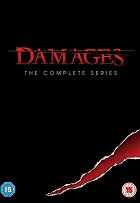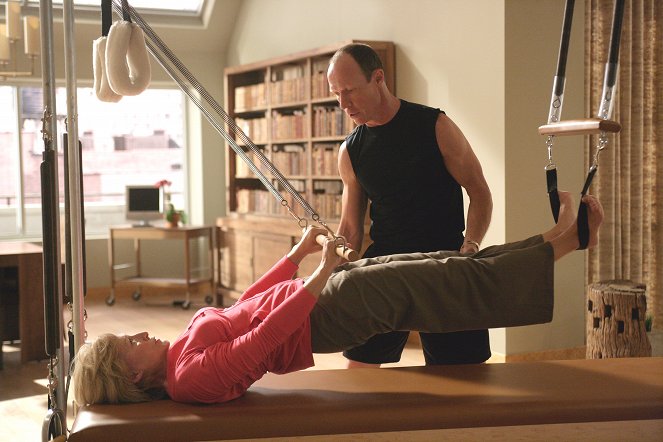Musik:
James S. LevineBesetzung:
Glenn Close, Rose Byrne, Tate Donovan, Zachary Booth, Ted Danson, Anastasia Griffith, Michael Nouri, Noah Bean, Željko Ivanek, Casey Siemaszko (mehr)Streaming (2)
Staffel(5) / Folgen(59)
Inhalte(1)
Zwei Frauen, eine Kanzlei: Die knallharte Star-Juristin Patty Hewes und die Junganwältin Ellen Parsons kennen nur ein Ziel: Kampf gegen Korruption und Unrecht. Und das bedeutet vor allem Vernichtung des eiskalten Milliardärs und Betrügers Arthur Frobisher. (Sat.1 Emotions)
Kritiken (2)
Endlich mal eine ordentliche Serie aus dem Juristenumfeld!!! Ich bin absolut hingerissen von dem durchdachten Drehbuch und den hervorragenden schauspielerischen Leistungen - Glenn Close als Anwältin Patty Hewes ist absolut überzeugend, Rose Byrne als Ellen Parsons stellt für mich eine der sympathischsten Serienfiguren überhaupt dar, und zwei bewährte Serienschauspieler - der sympathische Vater von Marissa aus O. C., California. Tate Donovan und der Gegenspieler von Jack Bauer aus der ersten Staffel von 24 Hours, Zejlko Ivanek, ergänzen das weibliche Duo hervorragend. Gerade die Figur des Ray Fisko gespielt von Ivanek sehe ich wohl als die tragischste der gesamten Serie. Ein weiteres Positivum besteht in der realistischen Schilderung der Personen - keine von ihnen wird eindeutig positiv oder eindeutig negativ präsentiert. Auch die engelsgleiche Ellen hat ihre Schattenseiten, genauso wie sich der "böse“ Arthur Frobisher großzügig und menschlich verhalten kann. Dadurch, dass die Serie in zwei und mehr Zeitebenen spielt, erfordert sie vom Zuschauer verschärfte Aufmerksamkeit, es darf einem kein Teil entgehen. Mir gefallen auch sehr gut die Erkennungsmelodie und die Musik, die die Serie untermalt. Mir fällt nichts ein, was ich dieser Serie vorwerfen könnte, also abschließend - her mit der zweiten Staffel!
()
They plot, manipulate, intrigue, play psychological chess with everybody in all situations, ethics mean nothing to them and they are willing to go over the edge of the “imaginable"... A cold, calculating, heartless world of corporate lawyers as Michael Clayton showed it in the series, which is good to approach like one whole movie founded on the psychology, development and actions of the characters and not like a thirteen part classic crime-lawyer series, where each episode can stand alone. Each season comprises one case, it’s about invisible months of meticulous work in the background, about a solid criminal element and primarily about perfectly illustrated characters on both sides of the barricades. It has been the fashion for some years now that characters are not depicted “in black-and-white", but nobody has yet gone quite this far without leaving the realm of convincingness, which makes it easy to think to yourself: “these aren’t just characters, but people made of flesh and blood". And this doesn’t apply only to the central duo who are btw the best and strongest women’s team in a (not only) TV production. The above applies primarily to season one (5/5). Season two (4/5) isn’t at all bad in itself, but the creators failed to pluck up the courage to depart from the original concept (two timelines that draw closer and closer to each other with every episode, meeting at the ending) and to come up with something new. It suited last season and made sense, but here it is redundant. Although the case itself is more interesting “on paper", it isn’t as thought out to the last detail and nicely set up as last time, also it focuses more on “thrilleroid" plots that sometimes seem a little incongruous than on suspects. You can hear paper rustle a couple of times, but mostly it works as it should and it is outstanding again, I’m telling you. Again, mainly thanks to the characters and their psychology. In season three (4/5) the creators at last realized that there is no point in trying to live up to season one using “its weapons" and they approached it a little differently; that is, the same but in a different way. They completely abandoned the “thrilleroidness" of season two and returned to focusing on the case at hand and its ins and outs. But despite the changes, psychology, intrigue and rights (to money) still play center stage, it wouldn’t be the same without that. What trips up this otherwise splendid season is the ending which lacks tension, too much happens and the whole denouement is so hurried that it loses all effect; and it remains strangely open-ended. Season four (2/5) changed TV stations and came under the wing of a small station which adapted the format to ten episodes, each of which are about ten minutes longer. At the same time it is evident that they poured less money into this, which doesn’t necessarily matter in a series founded on characters and dialogs, but in view of the fact that the creators of Damages never feared exteriors and filmmaking approaches, this cold interiors, void of people, home video look is really sad. The main theme well chosen and current, but unfortunately killed (like the whole season) by the drawn-out beginning when nothing at all happens in the first episodes and, when it does, it is boring and predictable. Here and there suspense, intrigues, emotions or thumb sketches of behind the scenes in big cases. Here there we get just empty yapping with no result; the main trio at least tries a little to do something about this, but with no great success. It’s true, toward the end it gets (a little) better and traces of the good old Damages are to be seen, but the problem is that traces are all that this season ever gives. While the previous seasons forced you to watch them all in one go, with season four it’s hard to force yourself to put on the next episode.
()
(weniger)
(mehr)

